AWM137 2/2 - Historical information and general development of the RAAF Nursing Service - Letters and Histories for Press - Public Relations World War 2 - Part 3
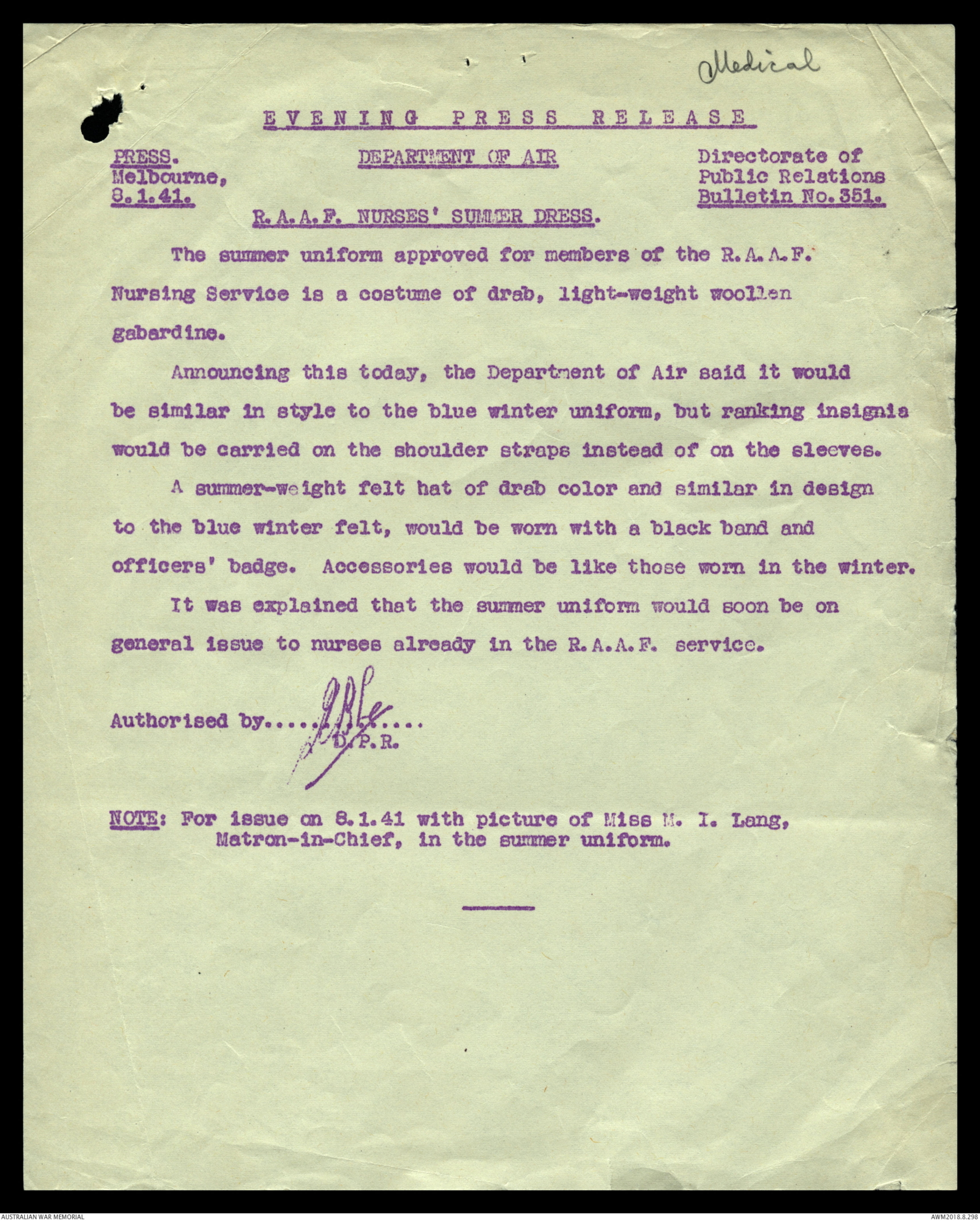
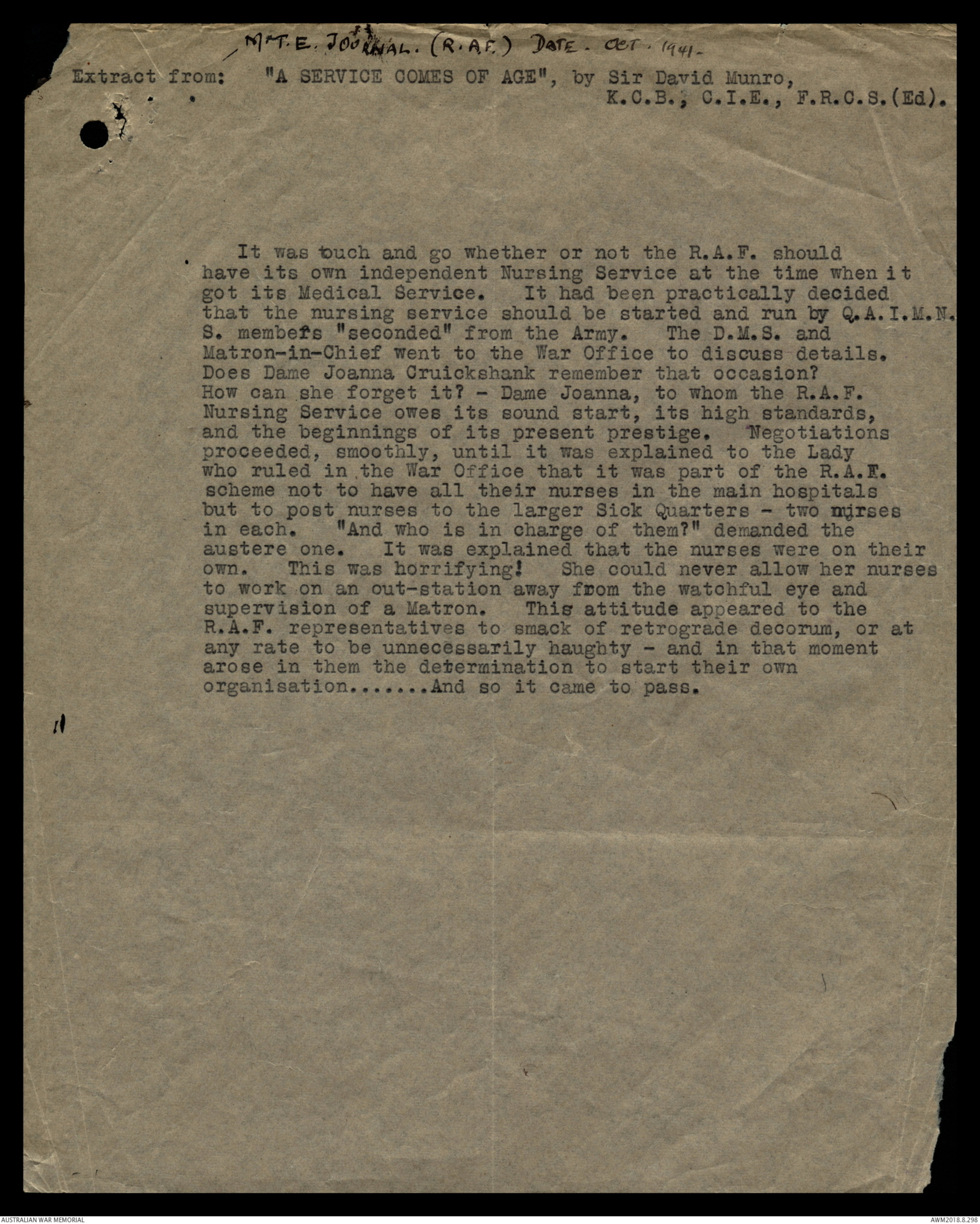
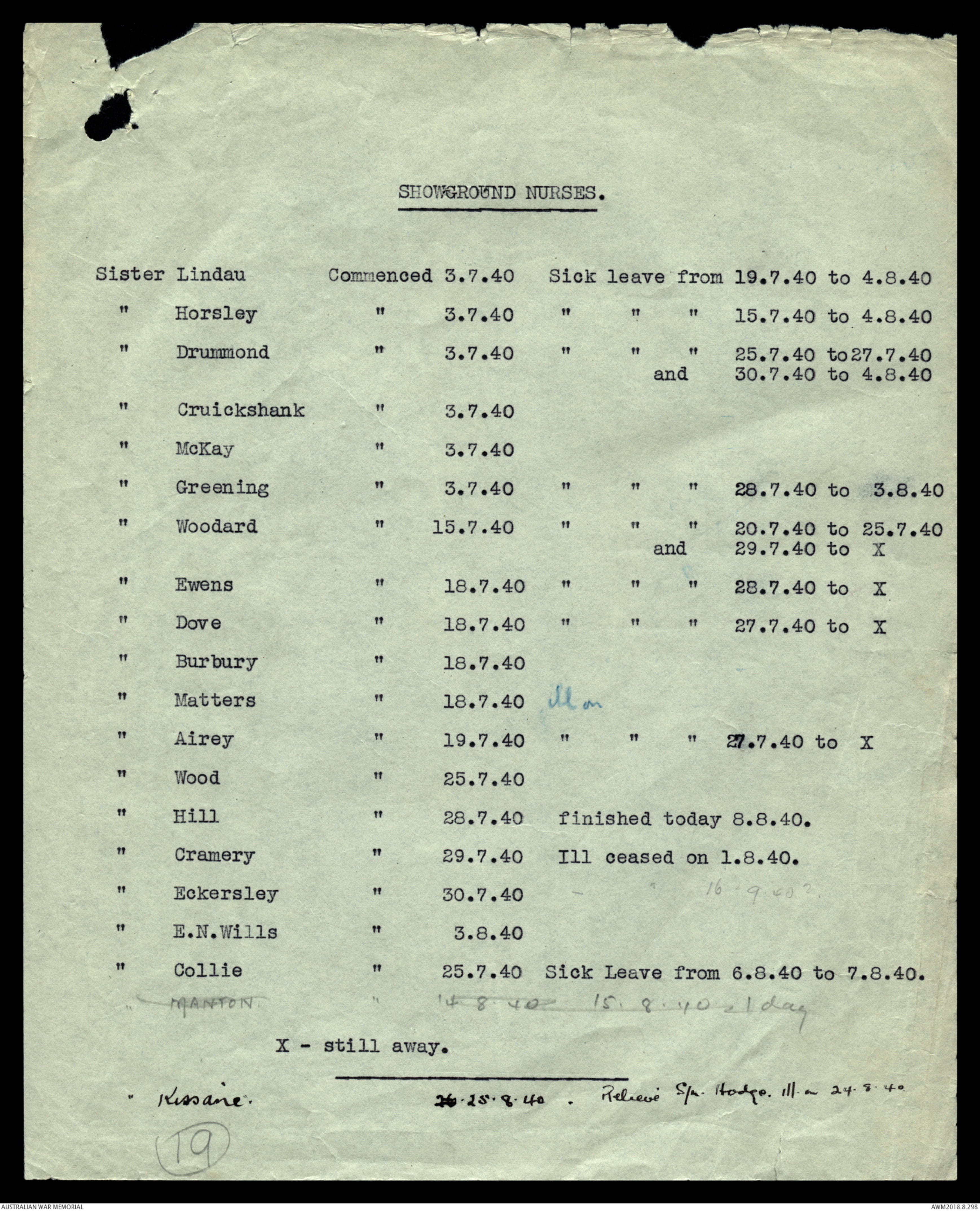
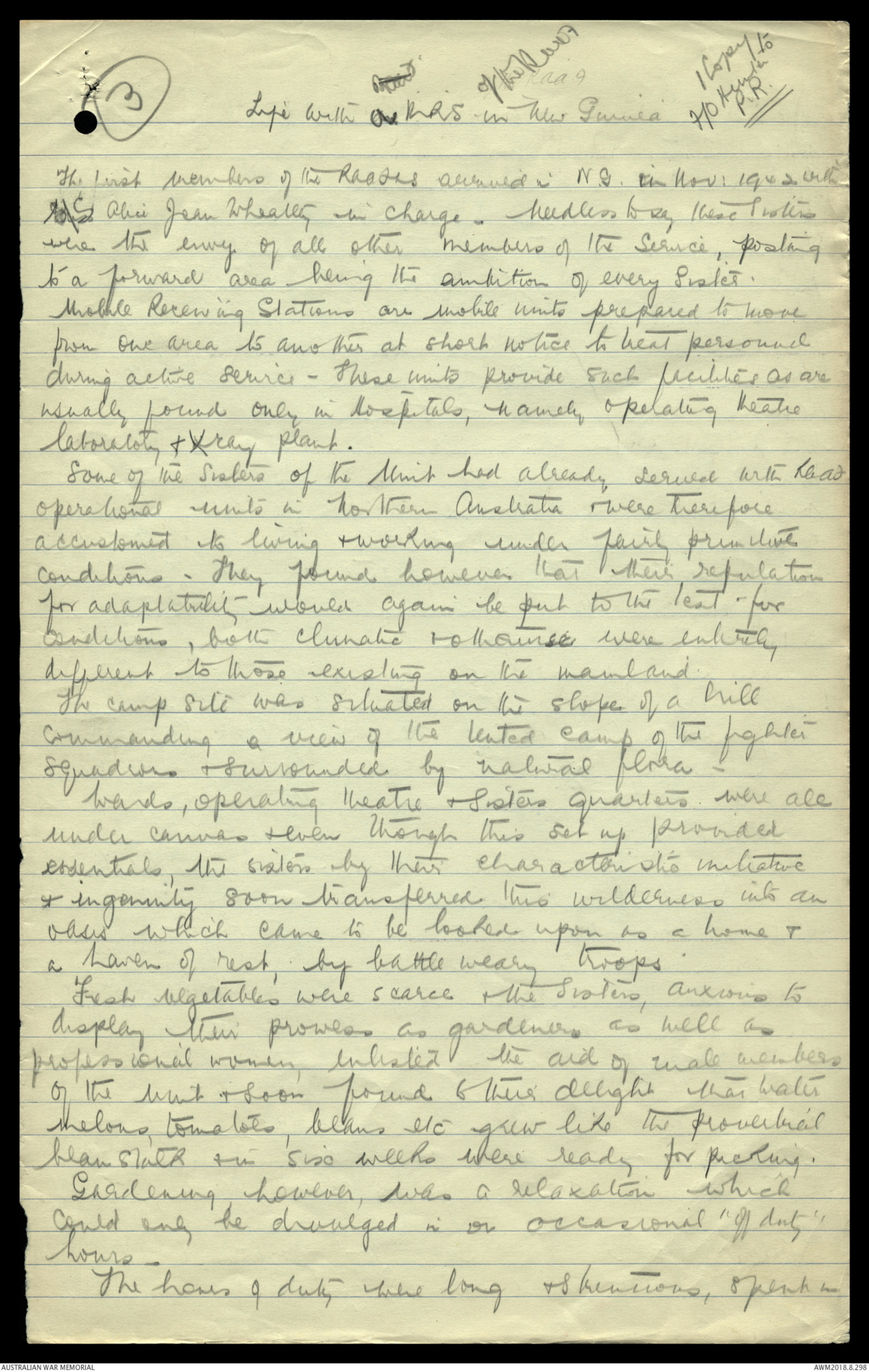
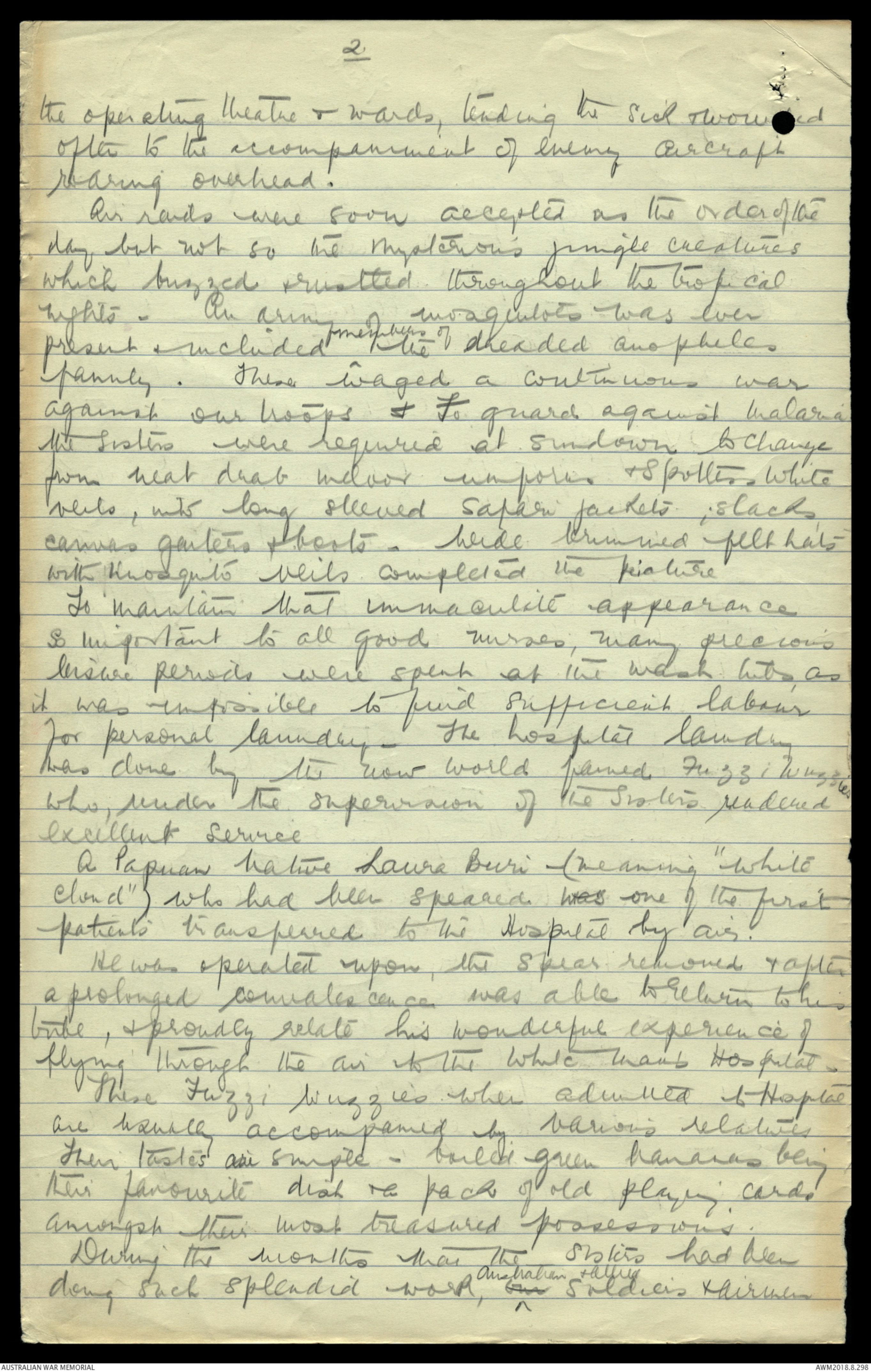
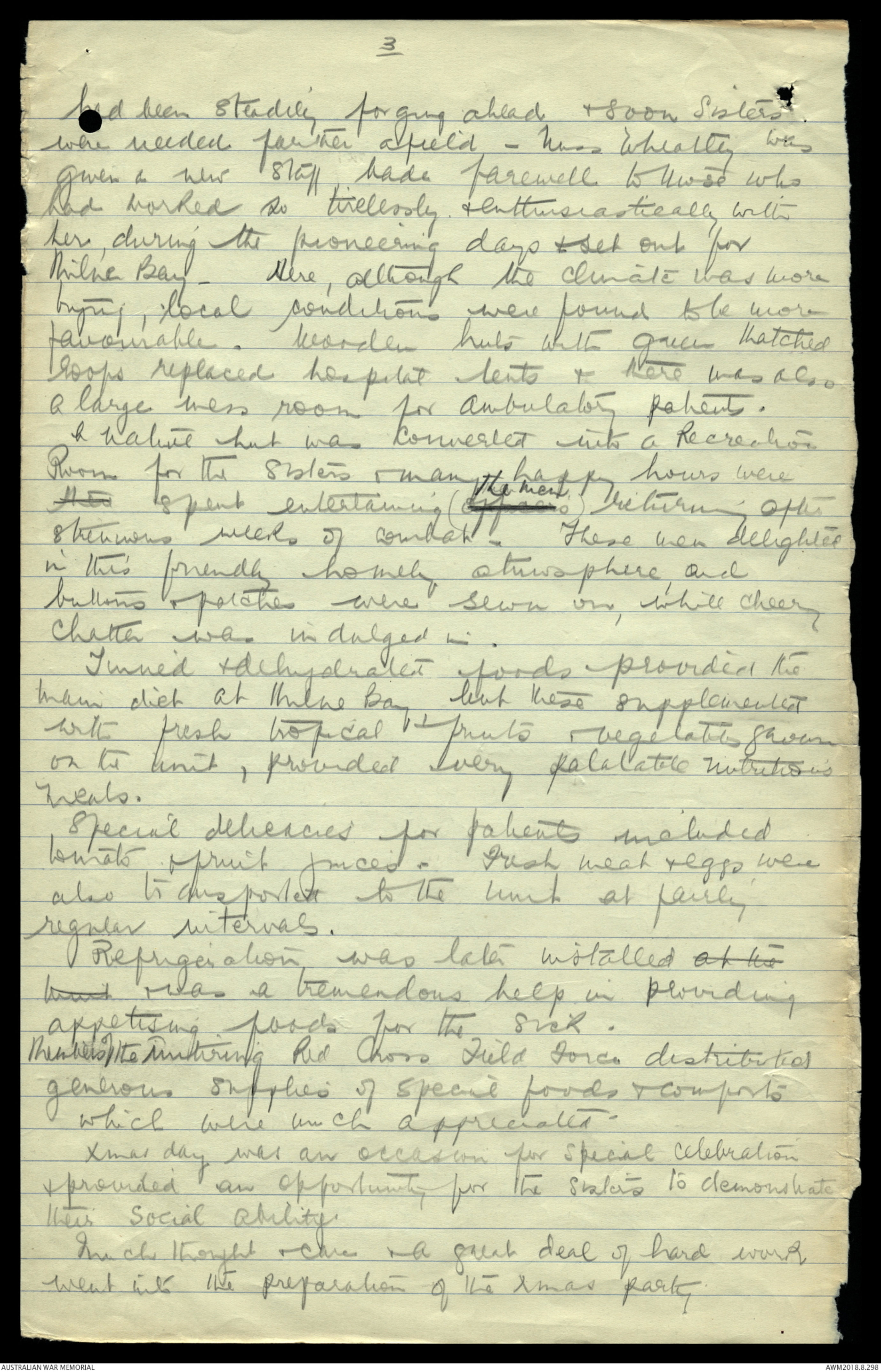
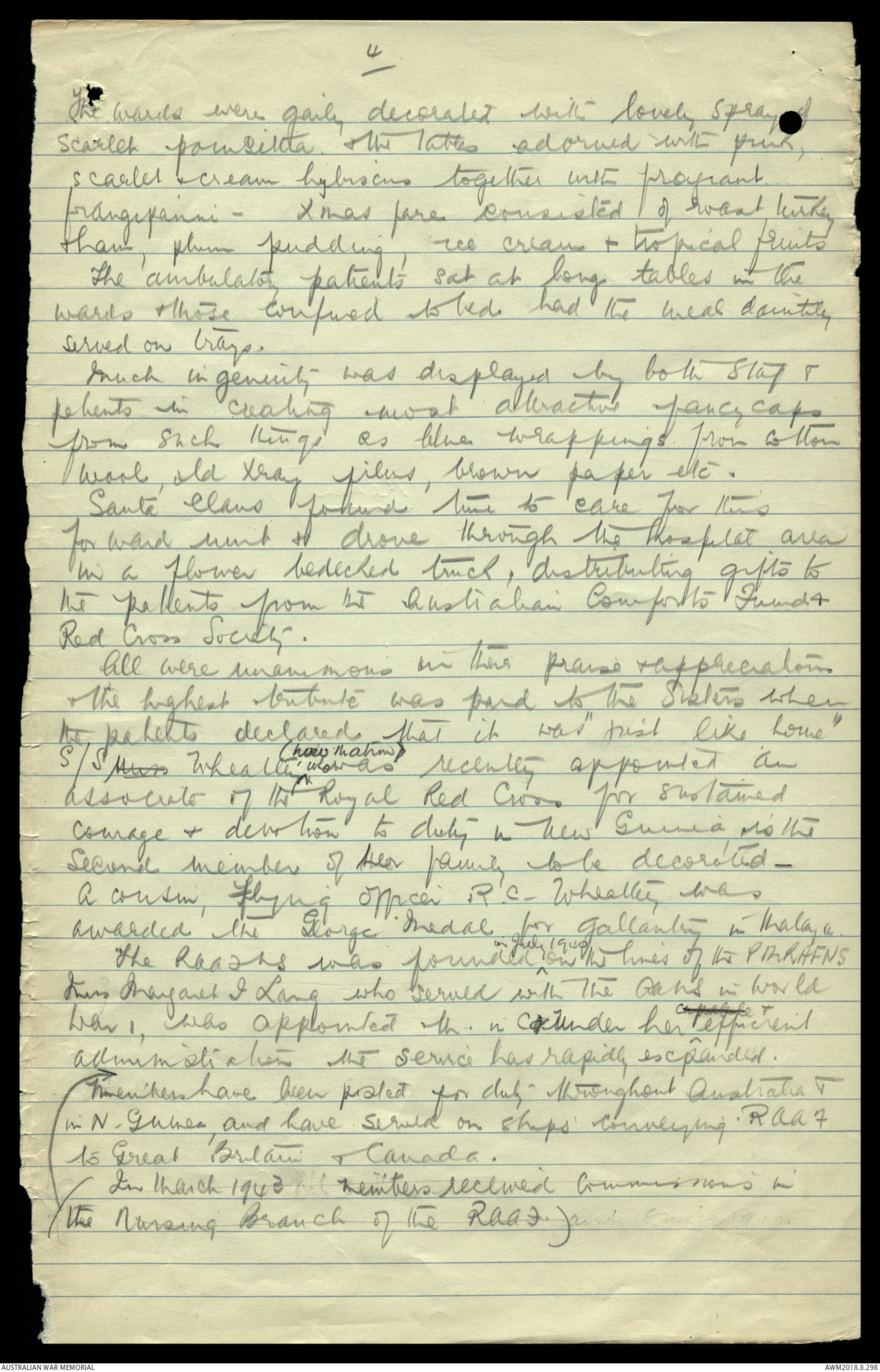
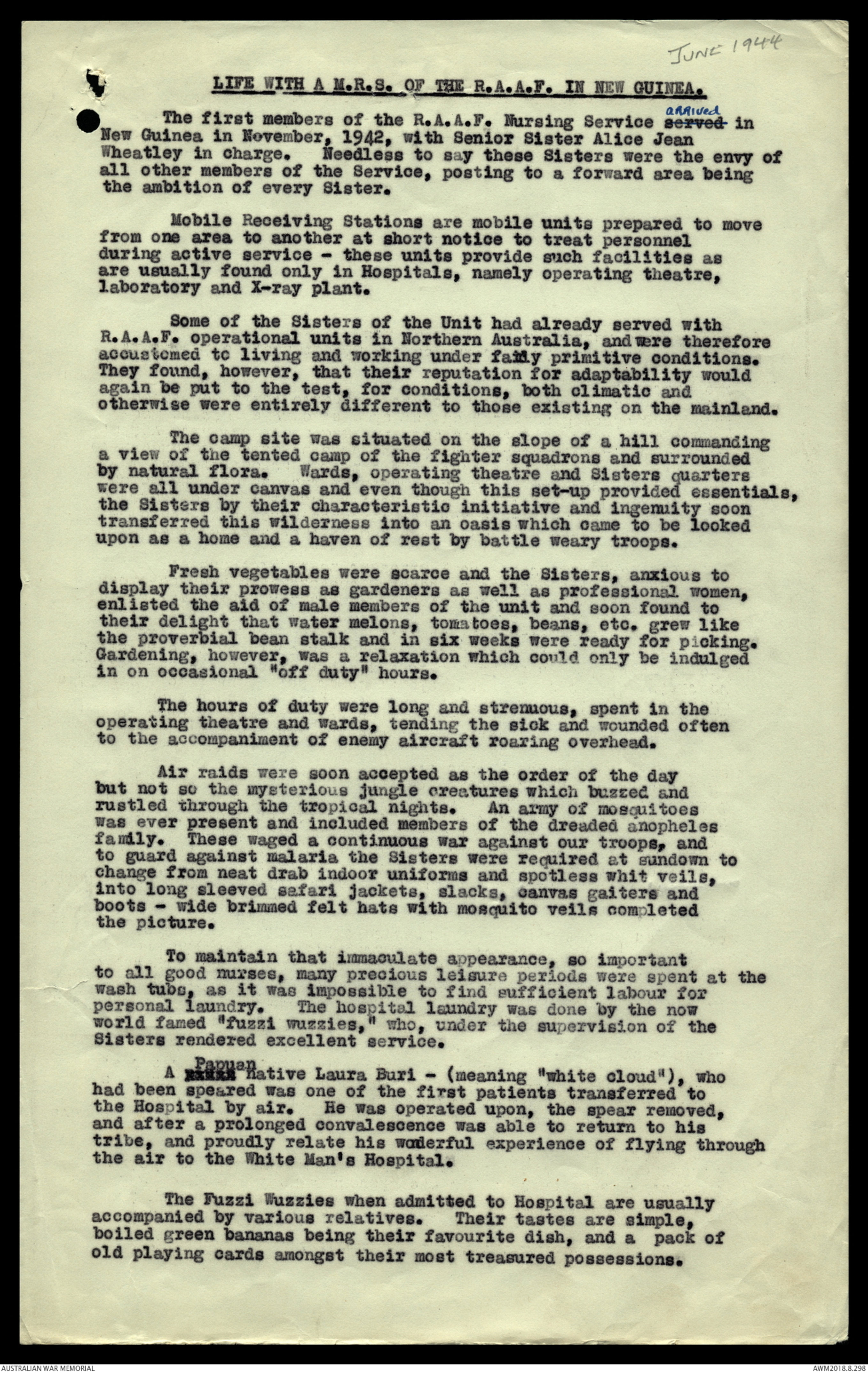
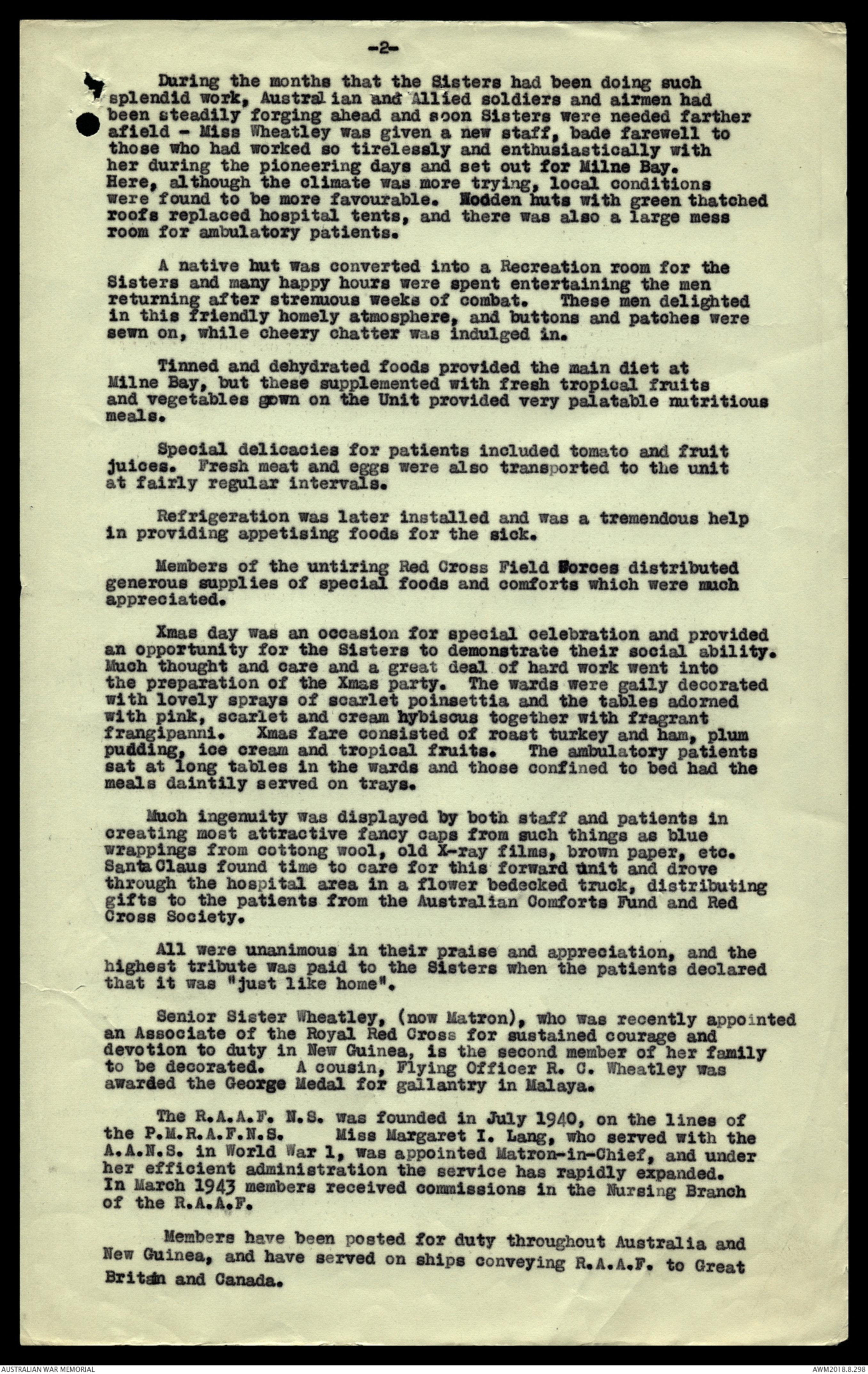
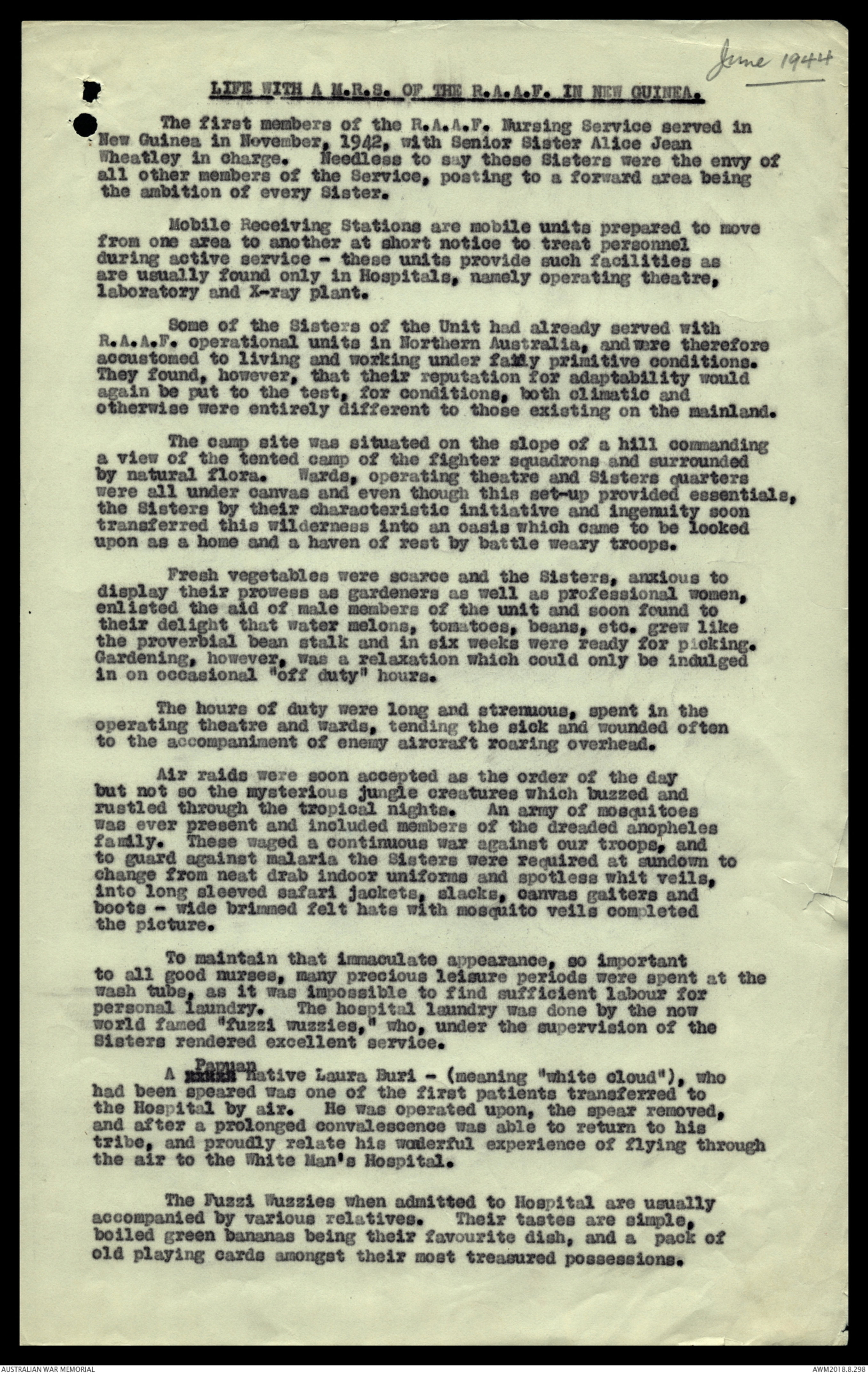
[*Medical*]
EVENING PRESS RELEASE
PRESS
Melbourne,
8.1.41.
DEPARTMENT OF AIR
Directorate of
Public Relations
Bulletin No. 351.
R.A.A.F. NURSES' SUMMER DRESS.
The summer uniform approved for members of the R.A.A.F.
Nursing Service is a costume of drab, light-weight woollen
gabardine.
Announcing this today, the Department of Air said it would
be similar in style to the blue winter uniform, but ranking insignia
would be carried on the shoulder straps instead of on the sleeves.
A summer-weight felt hat of drab color and similar in design
to the blue winter felt, would be worn with a black band and
officers’ badge. Accessories would be like those worn in the winter.
It was explained that the summer uniform would soon be on
general issue to nurses already in the R.A.A.F. service.
Authorised by J B L
D.P.R
NOTE: For issue on 8.1.41 with picture of Miss M. I. Lang,
Matron-in-Chief, in the summer uniform.
[*M&T.E. JOURNAL (R.A.F) DATE OCT 1941.*]
Extract from: "A SERVICE COMES OF AGE", by Sir David Munro,
K.C.B., C.I.E., F.R.C.S. (Ed).
It was touch and go whether or not the R.A.F. should
have its own independent Nursing Service at the time when it
got its Medical Service. It had been practically decided
that the nursing service should be started and run by Q.A.I.M.N.S.
members "seconded" from the Army. The D.M.S. and
Matron-in-Chief went to the War Office to discuss details.
Does Dame Joanna Cruickshank remember that occasion?
How can she forget it? - Dame Joanna, to whom the R.A.F.
Nursing Service owes its sound start, its high standards,
and the beginnings of its present prestige. Negotiations
proceeded, smoothly, until it was explained to the Lady
who ruled in the War Office that it was part of the R.A.F.
scheme not to have all their nurses in the main hospitals
but to post nurses to the larger Sick Quarters - two nurses
in each. "And who is in charge of them?" demanded the
austere one. It was explained that the nurses were on their
own. This was horrifying! She could never allow her nurses
to work on an out-station away from the watchful eye and
supervision of a Matron. This attitude appeared to the
R.A.F. representatives to smack of retrograde decorum, or at
any rate to be unnecessarily haughty - and in that moment
arose in them the determination to start their own
organisation ..................And so it came to pass.
SHOWGROUND NURSES.
| Sister Lindau | Commenced 3.7.40 | Sick leave from 19.7.40 to 4.8.40 |
| " Horsley | " 3.7.40 | " " " 15.7.40 to 4.8.40 |
| " Drummond | " 3.7.40 | " " " 25.7.40 to 27.7.40 and 30.7.40 to 4.8.40 |
| " Cruickshank | " 3.7.40 | |
| " McKay | " 3.7.40 | |
| " Greening | " 3.7.40 | " " " 28.7.40 to 3.8.40 |
| " Woodard | " 15.7.40 | " " " 20.7.40 to 25.7.40 and 29.7.40 to X |
| " Ewens | " 18.7.40 | " " " 28.7.40 to X |
| " Dove | " 18.7.40 | " " " 27.7.40 to X |
| " Burbury | " 18.7.40 | |
| " Matters | " 18.7.40 | ill on |
| " Airey | " 19.7.40 | " " " 27.7.40 to X |
| " Wood | " 25.7.40 | |
| " Hill | " 28.7.40 | finished today 8.8.40. |
| " Cramery | " 29.7.40 | Ill ceased on 1.8.40. |
| " Eckersley | " 30.7.40 | " " 16.9.40? |
| " E.N. Wills | " 3.8.40 | " " " |
| " Collie | " 25.7.40 | Sick Leave from 6.8.40 to 7.8.40. |
| " |
" |
|
| X - still away. | ||
| " Kissane | " |
Relieve S/n Hodge ill on 24.8.40 |
19
3
[*1 Copy to
F/O Henter
P.R.*]
Life with a MRS. of the RAAF in New Guinea
The first members of the RAAFNS arrived in N.G. in Nov. 1942 with
S\S Alice Jean Wheatley in charge. Needless to say these Sisters
were the envy of all other members of the Service, posting
to a forward area being the ambition of every Sister.
Mobile Receiving Stations are mobile units prepared to move
from one area to another at short notice to treat personnel
during active service - These units provide such facilities as are
usually found only in hospitals, namely operating theatre
laboratory & Xray plant.
Some of the Sisters of the Unit had already served with head
operational units in Northern Australia & were therefore
accustomed to living & working under fairly primitive
conditions. They found however that their reputation
for adaptability would again be put to the test - for
conditions, both climatic & otherwise were entirely
different to those existing on the mainland.
The camp site was situated on the slope of a hill
commanding a view of the tented camp of the fighter
squadrons & surrounded by natural flora -
Wards, operating theatre & Sisters quarters were all
under canvas & even though this set up provided
essentials, the sisters by their characteristic initiative
& ingenuity soon transferred this wilderness into an
oasis which came to be looked upon as a home &
a haven of rest, by battle weary troops.
Fresh vegetables were scarce & the Sisters, anxious to
display their prowess as gardeners as well as
professional women, enlisted the aid of male members
of the unit & soon found to their delight that water
melons, tomatoes, beans etc grew like the proverbial
beanstalk & in six weeks were ready for picking.
Gardening however, was a relaxation which
could only be divulged in on occasional "off duty"
hours.
The hours of duty were long & strenuous, spent in
2.
the operating theatre & wards, tending to sick & wounded
often to the accompaniment of enemy aircraft
roaring overhead.
Air raids were soon accepted as the order of the
day but not so the mysterious jungle creatures
which buzzed & rustled throughout the tropical
nights. An army of mosquitoes was ever
present & included members of the dreaded anopheles
family. These waged a continuous war
against our troops & to guard against Malaria
the Sisters were required at sundown to change
from neat drab indoor uniforms & spotless white
vests, into long sleeved safari jackets; slacks
canvas gaiters & boots. Wide brimmed felt hats
with mosquito veils completed the picture
To maintain that immaculate appearance
so important to all good nurses, many precious
leisure periods were spent at the wash tubs, as
it was impossible to find sufficient labour
for personal laundry - The hospital laundry
was done by the now world famed Fuzzi Wuzzies
who under the supervision of the Sisters rendered
excellent service
A Papuan Native Laura Buri -(meaning "white
cloud") who had been speared was one of the first
patients transferred to the Hospital by air.
He was operated upon, the spear removed & after
a prolonged convalescence was able to return to his
tribe, & proudly relate his wonderful experience of
flying through the air to the white man's Hospital.
These Fuzzi Wuzzies when admitted to Hospital
are usually accompanied by various relatives
Their tastes are simple - boiled green bananas being
their favourite dish & a pack of old playing cards
amongst their most treasured possessions.
During the months that the sisters had been
doing such splendid work, our Australian & allied soldiers & airmen
3
had been steadily forging ahead & soon Sisters
were needed farther afield - Miss Wheatley was
given a new Staff, bade farewell to those who
had worked so tirelessly & enthusiastically with
her, during the pioneering days & set out for
Milne Bay. Here, although the climate was more
trying, local conditions were found to be more
favourable. Wooden huts with green thatched
roofs replaced hospital tents & there was also
a large mess room for ambulatory patients.
A native hut was converted into a Recreation
Room for the Sisters & many happy hours werethen spent entertaining (officers the men) returning after
strenuous weeks of combat. These men delighted
in this friendly homely atmosphere, and
buttons & patches were sewn on, while cheery
chatter was indulged in.
Tinned & dehydrated foods provided the
main diet at Milne Bay, but these supplemented
with fresh tropical fruits & vegetables grown
on the unit, provided very palatable nutritious
meals.
Special delicacies for patients included
tomato & fruit juices. Fresh meat & eggs were
also to transported to the unit at fairly
regular intervals.
Refrigeration was later installed at theunit & was a tremendous help in providing
appetising foods for the sick.
Members of the untiring Red Cross Field Forces distributed
generous supplies of special foods & comforts
which were much appreciated.
Xmas day was an occasion for special celebration
& provided an opportunity for the sisters to demonstrate
their social ability.
Much thought & care & a great deal of hard work
went into the preparation of the Xmas party
4
The wards were gaily decorated with lovely sprayed
scarlet poinsettia & the tables adorned with pink,
scarlet & cream hybiscus together with fragrant
frangipanni- Xmas fare consisted of roast turkey
& ham, plum pudding, ice cream & tropical fruits
The ambulatory patients sat at long tables in the
wards & those confined to bed had the meal daintily
served on trays.
Much ingenuity was displayed by both Staf &
patients in creating most attractive fancy caps
from such things as blue wrappings from cotton
wool, old Xray films, brown paper etc.
Santa Claus found time to care for this
forward unit & drove through the Hospital area
in a flower bedecked truck, distributing gifts to
the patients from the Australian Comforts Fund &
Red Cross Society.
All were unanimous in their praise & appreciation
& the highest tribute was paid to the Sisters when
the patients declared that it was "just like home"
S/S Miss Wheatley ∧(now matron) was recently appointed an
associate of the Royal Red Cross for sustained
courage & devotion to duty in New Guinea & is the
Second member of her family to be decorated -
a cousin, flying officer R.C. Wheatley was
awarded the George Medal for gallantry in Malaya.
The RAAFNS was founded in July 1940, on the lines of the PMRAFNS
Miss Margaret I Lang who served with the AANS in World
War 1, was appointed M. in C & under her ^capable & efficient
administration the service has rapidly expanded.
(In March 1943 members received Commissions in
The Nursing Branch of the RAAF)
Members have been posted for duty throughout Australia &
in N. Guinea, and have served on ships conveying R.A.A.F.
to Great Britain & Canada.
JUNE 1944
LIFE WITH A M.R.S. OF THE R.A.A.F. IN NEW GUINEA.
The first members of the R.A.A.F. Nursing Service served ∧ arrived in
New Guinea in November, 1942, with Senior Sister Alice Jean
Wheatley in charge. Needless to say these Sisters were the envy of
all other members of the Service, posting to a forward area being
the ambition of every Sister.
Mobile Receiving Stations are mobile units prepared to move
from one area to another at short notice to treat personnel
during active service - these units provide such facilities as
are usually found only in Hospitals, namely operating theatre,
laboratory and X-ray plant.
Some of the Sisters of the Unit had already served with
R.A.A.F. operational units in Northern Australia, and were therefore
accustomed to living and working under fairly primitive conditions.
They found, however, that their reputation for adaptability would
again be put to the test, for conditions, both climatic and
otherwise were entirely different to those existing on the mainland.
The camp site was situated on the slope of a hill commanding
a view of the tented camp of the fighter squadrons and surrounded
by natural flora. Wards, operating theatre and Sisters quarters
were all under canvas and even though this set-up provided essentials,
the Sisters by their characteristic initiative and ingenuity soon
transferred this wilderness into an oasis which came to be looked
upon as a home and a haven of rest by battle weary troops.
Fresh vegetables were scarce and the Sisters, anxious to
display their prowess as gardeners as well as professional women,
enlisted the aid of male members of the unit and soon found to
their delight that water melons, tomatoes, beans, etc. grew like
the proverbial bean stalk and in six weeks were ready for picking.
Gardening, however, was a relaxation which could only be indulged
in on occasional "off duty" hours.
The hours of duty were long and strenuous, spent in the
operating theatre and wards, tending the sick and wounded often
to the accompaniment of enemy aircraft roaring overhead.
Air raids were soon accepted as the order of the day
but not so the mysterious jungle creatures which buzzed and
rustled through the tropical nights. An army of mosquitoes
was ever present and included members of the dreaded anopheles
family. These waged a continuous war against our troops, and
to guard against malaria the Sisters were required at sundown to
change from neat drab indoor uniforms and spotless whit veils,
into long sleeved safari jackets, slacks, canvas gaiters and
boots - wide brimmed felt hats with mosquito veils completed
the picture.
To maintain that immaculate appearance, so important
to all good nurses, many precious leisure periods were spent at the
wash tubs, as it was impossible to find sufficient labour for
personal laundry. The hospital laundry was done by the now
world famed "fuzzi wuzzies," who, under the supervision of the
Sisters rendered excellent service.
A xxxx Papuan native Laura Buri - (meaning "white cloud"), who
had been speared was one of the first patients transferred to
the Hospital by air. He was operated upon, the spear removed,
and after a prolonged convalescence was able to return to his
tribe, and proudly relate his wonderful experience of flying through
the air to the White Man's Hospital.
The Fuzzi Wuzzies when admitted to Hospital are usually
accompanied by various relatives. Their tastes are simple,
boiled green bananas being their favourite dish, and a pack of
old playing cards amongst their most treasured possessions.
-2-
During the months that the Sisters had been doing such
splendid work, Australian and Allied soldiers and airmen had
been steadily forging ahead and soon Sisters were needed farther
afield - Miss Wheatley was given a new staff, bade farewell to
those who had worked so tirelessly and enthusiastically with
her during the pioneering days and set out for Milne Bay.
Here, although the climate was more trying, local conditions
were found to be more favourable. Wooden huts with green thatched
roofs replaced hospital tents, and there was also a large mess
room for ambulatory patients.
A native hut was converted into a Recreation room for the
Sisters and many happy hours were spent entertaining the men
returning after strenuous weeks of combat. These men delighted
in this friendly homely atmosphere, and buttons and patches were
sewn on, while cheery chatter was indulged in.
Tinned and dehydrated foods provided the main diet at
Milne Bay, but these supplemented with fresh tropical fruits
and vegetables grown on the Unit provided very palatable nutritious
meals.
Special delicacies for patients included tomato and fruit
juices. Fresh meat and eggs were also transported to the unit
at fairly regular intervals.
Refrigeration was later installed and was a tremendous help
in providing appetising foods for the sick.
Members of the untiring Red Cross Field Forces distributed
generous supplies of special foods and comforts which were much
appreciated.
Xmas day was an occasion for special celebration and provided
an opportunity for the Sisters to demonstrate their social ability.
Much thought and care and a great deal of hard work went into
the preparation of the Xmas party. The wards were gaily decorated
with lovely sprays of scarlet poinsettia and the tables adorned
with pink, scarlet and cream hybiscus together with fragrant
frangipanni. Xmas fare consisted of roast turkey and ham, plum
pudding, ice cream and tropical fruits. The ambulatory patients
sat at long tables in the wards and those confined to bed had the
meals daintily served on trays.
Much ingenuity was displayed by both staff and patients in
creating most attractive fancy caps from such things as blue
wrappings from cottong wool, old X-ray films, brown paper, etc.
Santa Claus found time to care for this forward unit and drove
through the hospital area in a flower bedecked truck, distributing
gifts to the patients from the Australian Comforts Fund and Red
Cross Society.
All were unanimous in their praise and appreciation, and the
highest tribute was paid to the Sisters when the patients declared
that it was "just like home".
Senior Sister Wheatley, (now Matron), who was recently appointed
an Associate of the Royal Red Cross for sustained courage and
devotion to duty in New Guinea, is the second member of her family
to be decorated. A cousin, Flying Officer R. C. Wheatley was
awarded the George Medal for gallantry in Malaya.
The R.A.A.F. N.S. was founded in July 1940, on the lines of
the P.M.R.A.F.N.S. Miss Margaret I. Lang, who served with the
A. A.N.S. in World War 1, was appointed Matron in Chief, and under
her efficient administration the service has rapidly expanded.
In March 1943 members received commissions in the Nursing Branch
of the R.A.A.F.
Members have been posted for duty throughout Australia and
New Guinea, and have served on ships conveying R.A.A.F. to Great
Britain and Canada.
JUNE 1944
LIFE WITH A M.R.S. OF THE R.A.A.F. IN NEW GUINEA.
The first members of the R.A.A.F. Nursing Service served in
New Guinea in November, 1942, with Senior Sister Alice Jean
Wheatley in charge. Needless to say these Sisters were the envy of
all other members of the Service, posting to a forward area being
the ambition of every Sister.
Mobile Receiving Stations are mobile units prepared to move
from one area to another at short notice to treat personnel
during active service - these units provide such facilities as
are usually found only in Hospitals, namely operating theatre,
laboratory and X-ray plant.
Some of the Sisters of the Unit had already served with
R. A.A .F. operational units in Northern Australia, and were therefore
accustomed to living and working under fairly primitive conditions.
They found, however, that their reputation for adaptability would
again be put to the test, for conditions, both climatic and
otherwise were entirely different to those existing on the mainland.
The camp site was situated on the slope of a hill commanding
a view of the tented camp of the fighter squadrons and surrounded
by natural flora. Wards, operating theatre and Sisters quarters
were all under canvas and even though this set-up provided essentials,
the Sisters by their characteristic initiative and ingenuity soon
transferred this wilderness into an oasis which came to be looked
upon as a home and a haven of rest by battle weary troops.
Fresh vegetables were scarce and the Sisters, anxious to
display their prowess as gardeners as well as professional women,
enlisted the aid of male members of the unit and soon found to
their delight that water melons, tomatoes, beans, etc. grew like
the proverbial bean stalk and in six weeks were ready for picking.
Gardening, however, was a relaxation which could only be indulged
in on occasional "off duty" hours.
The hours of duty were long and strenuous, spent in the
operating theatre and wards, tending the sick and wounded often
to the accompaniment of enemy aircraft roaring overhead.
Air raids were soon accepted as the order of the day
but not so the mysterious jungle creatures which buzzed and
rustled through the tropical nights. An army of mosquitoes
was ever present and included members of the dreaded anopheles
family. These waged a continuous war against our troops, and
to guard against malaria the Sisters were required at sundown to
change from neat drab indoor uniforms and spotless whit veils,
into long sleeved safari jackets, slacks, canvas gaiters and
boots - wide brimmed felt hats with mosquito veils completed
the picture.
To maintain that immaculate appearance, so important
to all good nurses, many precious leisure periods were spent at the
wash tubs, as it was impossible to find sufficient labour for
personal laundry. The hospital laundry was done by the now
world famed "fuzzi wuzzies," who, under the supervision of the
Sisters rendered excellent service.
A xxxx Papuan native Laura Buri - (meaning "white cloud"), who
had been speared was one of the first patients transferred to
the Hospital by air. He was operated upon, the spear removed,
and after a prolonged convalescence was able to return to his
tribe, and proudly relate his wonderful experience of flying through
the air to the White Man's Hospital.
The Fuzzi Wuzzies when admitted to Hospital are usually
accompanied by various relatives. Their tastes are simple,
boiled green bananas being their favourite dish, and a pack of
old playing cards amongst their most treasured possessions.
 Not Yet Replaced By AI
Not Yet Replaced By AIThis transcription item is now locked to you for editing. To release the lock either Save your changes or Cancel.
This lock will be automatically released after 60 minutes of inactivity.